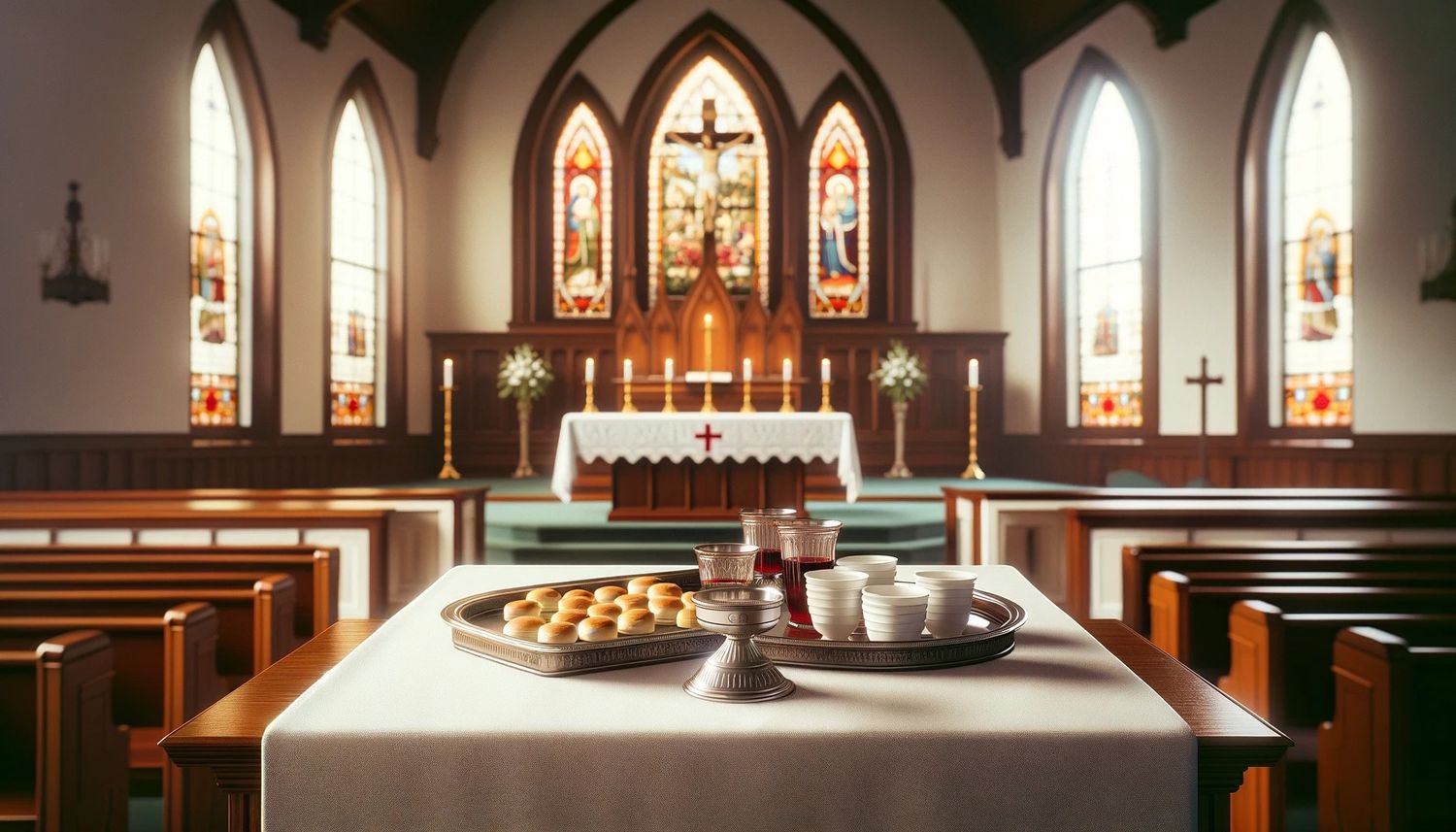Home>Theology and Spirituality>How To Become A Deacon In A Baptist Church


Theology and Spirituality
How To Become A Deacon In A Baptist Church
Published: February 21, 2024
Jason DeRose, Managing Editor at Christian.net, uses his expertise in religion and journalism to deepen understanding of faith's societal impacts. His editorial leadership, coupled with a strong academic background, enriches the platform’s diverse content, earning him recognition in both journalism and religious circles.
Learn the steps to become a deacon in a Baptist church and explore the theological and spiritual aspects of this important role. Gain insight into the requirements and responsibilities.
(Many of the links in this article redirect to a specific reviewed product. Your purchase of these products through affiliate links helps to generate commission for Christian.net, at no extra cost. Learn more)
Table of Contents
Introduction
Becoming a deacon in a Baptist church is a significant and honorable undertaking that requires dedication, spiritual maturity, and a deep commitment to serving the congregation. The role of a deacon is rooted in the biblical tradition and holds a position of great responsibility within the church community. Aspiring deacons are called to embody the values of compassion, humility, and servant leadership as they support the spiritual and practical needs of the church and its members.
The journey to becoming a deacon is a transformative process that involves spiritual discernment, intentional preparation, and a sincere desire to serve others. It is a calling that requires individuals to exemplify the teachings of Jesus Christ and demonstrate a genuine love for God and their fellow believers. As such, the path to deaconship is not merely a formal appointment, but a deeply spiritual and personal commitment to living out the principles of faith and servanthood.
In the following sections, we will explore the multifaceted aspects of becoming a deacon in a Baptist church, including the qualifications, training, and responsibilities associated with this esteemed role. By delving into the foundational principles and practical considerations of deaconship, we aim to provide a comprehensive guide for those who are discerning the call to serve as deacons and seek to understand the profound significance of this ministry within the Baptist tradition.
Read more: How To Become A Bishop In The Baptist Church
Understanding the Role of a Deacon in a Baptist Church
The role of a deacon in a Baptist church is deeply rooted in the principles of servant leadership and compassionate ministry. Deacons are called to embody the teachings of Jesus Christ by serving the spiritual and practical needs of the congregation and the broader community. While the specific responsibilities of deacons may vary among different Baptist denominations, the fundamental essence of their role remains consistent across traditions.
Deacons are entrusted with the task of providing spiritual support, guidance, and care to the members of the church. They often serve as a vital link between the pastoral leadership and the congregation, offering a compassionate presence to those in need and fostering a sense of unity and fellowship within the church community. In many Baptist churches, deacons play a crucial role in assisting with the administration of sacraments, such as the Lord's Supper, and participating in the worship services as spiritual leaders.
Moreover, deacons are called to demonstrate a spirit of humility and selflessness in their service, reflecting the example set forth by Jesus, who washed the feet of his disciples as a symbol of servanthood. This humble approach to leadership is central to the role of a deacon, as they are called to prioritize the well-being of others above their own and to lead by example in living out the values of compassion, integrity, and faithfulness.
In addition to their spiritual duties, deacons often engage in practical acts of service within the church and the wider community. This may include providing assistance to those facing financial hardship, offering support to the sick and elderly, and participating in outreach initiatives aimed at addressing social issues and promoting justice and mercy. Through their actions, deacons exemplify the love of Christ and demonstrate a commitment to meeting both the spiritual and material needs of those they serve.
Overall, the role of a deacon in a Baptist church is multifaceted, encompassing spiritual leadership, compassionate care, and practical service. Deacons are called to be pillars of strength and sources of encouragement within the church, embodying the values of faith, hope, and love as they faithfully fulfill their calling to serve God and His people.
Requirements for Becoming a Deacon
Becoming a deacon in a Baptist church is a sacred responsibility that necessitates meeting specific requirements rooted in both biblical principles and the traditions of the church. While the exact qualifications may vary among different Baptist denominations, there are common foundational requirements that individuals must fulfill to be considered for the role of a deacon.
-
Spiritual Maturity: One of the primary requirements for becoming a deacon is the demonstration of spiritual maturity and a deep personal relationship with God. This entails a consistent and vibrant spiritual life, characterized by a commitment to prayer, regular study of the Scriptures, and a lifestyle reflective of Christian virtues.
-
Character and Integrity: Prospective deacons are expected to exhibit exemplary character and integrity in their personal and public lives. They should be known for their honesty, humility, and moral uprightness, serving as role models within the church community and beyond.
-
Sound Doctrine: A solid understanding of Christian doctrine and a commitment to upholding the teachings of the Bible are essential for individuals aspiring to become deacons. This includes a firm grasp of the foundational beliefs of the Christian faith and a willingness to align their lives with the principles outlined in the Scriptures.
-
Commitment to Service: Those seeking to become deacons must possess a genuine heart for serving others. This involves a willingness to sacrificially dedicate time, resources, and energy to meeting the needs of the church and its members, demonstrating a spirit of compassion and selflessness.
-
Supportive Spouse and Family: In some Baptist traditions, the support and involvement of a deacon's spouse and family are considered important factors. This reflects the understanding that the role of a deacon often extends to the entire family unit, requiring a collective commitment to the responsibilities and demands of deaconship.
-
Affirmation by the Church: Prospective deacons typically undergo a process of discernment and evaluation by the church leadership and congregation. This may involve a period of observation, mentorship, and assessment of the individual's qualifications, character, and suitability for the role of a deacon.
Meeting these requirements is foundational to the process of becoming a deacon in a Baptist church. It underscores the significance of spiritual maturity, moral integrity, and a genuine heart for service as essential attributes for those called to serve in this esteemed capacity. Aspiring deacons are encouraged to prayerfully consider these requirements and earnestly seek to embody the qualities that reflect the heart of servant leadership within the context of their faith community.
Steps to Becoming a Deacon
Becoming a deacon in a Baptist church is a deliberate and purposeful journey that involves several significant steps, each contributing to the individual's preparation and discernment for this sacred role. While the specific process may vary among different Baptist denominations, there are common steps that aspiring deacons typically undertake as they pursue this calling.
-
Discernment and Call: The first step in becoming a deacon is a personal discernment of one's call to serve in this capacity. This involves prayerful reflection, seeking spiritual guidance, and evaluating one's motivations and qualifications for deaconship. It is a time for individuals to earnestly seek God's will and confirm their sense of calling to this ministry.
-
Spiritual Formation: Aspiring deacons engage in intentional spiritual formation, deepening their understanding of the Scriptures, theology, and the principles of Christian discipleship. This may involve formal theological education, participation in spiritual retreats, and mentorship under the guidance of experienced church leaders.
-
Training and Education: Many Baptist churches provide specific training programs for individuals preparing for deaconship. These programs often cover topics such as pastoral care, church administration, and the historical and theological foundations of the deacon's role. Through these educational opportunities, individuals gain a comprehensive understanding of the responsibilities and expectations associated with deaconship.
-
Mentorship and Apprenticeship: Prospective deacons benefit from mentorship and apprenticeship under the guidance of seasoned deacons and church leaders. This hands-on experience allows individuals to observe and participate in the practical aspects of deacon ministry, gaining valuable insights and skills that are essential for effective service within the church community.
-
Ecclesiastical Approval: As individuals progress in their preparation for deaconship, they seek the affirmation and approval of the church leadership and congregation. This may involve a formal process of nomination, review, and confirmation by the church body, acknowledging the individual's readiness and suitability for the role of a deacon.
-
Ordination and Commissioning: Upon meeting the requirements and completing the necessary preparation, individuals are ordained and commissioned as deacons during a special church service. This solemn occasion signifies the official recognition of their calling and the commitment to serve the church and its members in the capacity of a deacon.
Each of these steps represents a vital phase in the journey toward becoming a deacon in a Baptist church. It is a process that encompasses spiritual discernment, education, practical training, and the affirmation of the faith community, culminating in the formal commissioning of individuals to fulfill the sacred responsibilities of deaconship. Aspiring deacons are encouraged to approach each step with humility, dedication, and a deep sense of reverence for the calling they have received, recognizing the profound significance of this ministry within the life of the church.
Training and Preparation for Deaconship
Training and preparation for deaconship in a Baptist church are integral components of the journey toward assuming this esteemed role. The process of becoming a deacon involves intentional and comprehensive preparation, equipping individuals with the knowledge, skills, and spiritual formation necessary to fulfill their responsibilities with wisdom and compassion.
Read more: How To Be A Deacon In The Lutheran Church
Theological Education and Spiritual Formation
Central to the training for deaconship is a focus on theological education and spiritual formation. Aspiring deacons engage in a deep exploration of the Scriptures, theological principles, and the historical context of the deacon's role within the church. This educational foundation provides individuals with a robust understanding of the biblical teachings, ethical considerations, and the theological underpinnings that inform their service as deacons. Moreover, spiritual formation nurtures a vibrant and authentic faith, fostering a deep connection to God and a genuine commitment to living out the values of servant leadership and compassion.
Practical Training and Skill Development
In addition to theological education, practical training and skill development are essential aspects of deacon preparation. This may involve learning about pastoral care, counseling, and effective communication, equipping individuals to provide spiritual support and guidance to those in need. Furthermore, deacon candidates often receive training in areas such as conflict resolution, community outreach, and administrative responsibilities within the church. This practical training equips individuals with the necessary skills to navigate the diverse challenges and opportunities they may encounter in their role as deacons.
Mentorship and Apprenticeship
Mentorship and apprenticeship under the guidance of experienced deacons and church leaders play a pivotal role in the preparation for deaconship. Through close mentorship, individuals have the opportunity to observe and learn from seasoned deacons, gaining valuable insights into the practical aspects of ministry, pastoral care, and the dynamics of serving within a faith community. This hands-on experience allows aspiring deacons to cultivate essential skills, receive constructive feedback, and develop a deep appreciation for the nuances of deaconship.
Continuing Education and Growth
The journey toward deaconship is an ongoing process of learning and growth. Even after assuming the role of a deacon, individuals are encouraged to engage in continuing education, spiritual enrichment, and professional development opportunities. This commitment to ongoing growth ensures that deacons remain equipped to address the evolving needs of the church and the community, staying attuned to the leading of the Holy Spirit and the ever-changing dynamics of pastoral ministry.
In essence, the training and preparation for deaconship encompass a holistic approach to equipping individuals for the multifaceted responsibilities of serving as deacons in a Baptist church. Through theological education, practical training, mentorship, and a commitment to ongoing growth, aspiring deacons are prepared to embody the values of servant leadership, compassion, and spiritual wisdom as they faithfully fulfill their calling to serve God and His people.
Read more: How Should A Baptist Church Choose A Deacon
Responsibilities of a Deacon
The responsibilities of a deacon in a Baptist church are multifaceted, encompassing spiritual leadership, compassionate care, and practical service within the church community and beyond. Deacons are called to exemplify the teachings of Jesus Christ through their actions and attitudes, serving as humble and dedicated servants who prioritize the well-being of others. The following are key responsibilities that deacons typically fulfill in their ministry:
-
Spiritual Support and Guidance: Deacons provide spiritual support and guidance to the members of the church, offering a compassionate presence to those in need. They may engage in pastoral care activities, such as visiting the sick, praying with individuals facing challenges, and offering counsel and encouragement to those navigating difficult circumstances.
-
Assistance with Sacraments: In many Baptist churches, deacons play a vital role in assisting with the administration of sacraments, particularly the Lord's Supper. They may participate in the preparation and distribution of the elements during communion services, symbolizing the unity of believers and the remembrance of Christ's sacrifice.
-
Fostering Unity and Fellowship: Deacons contribute to fostering a sense of unity and fellowship within the church community. They serve as empathetic listeners, mediators in times of conflict, and ambassadors of reconciliation, seeking to promote harmony and mutual support among the members of the congregation.
-
Practical Acts of Service: Deacons engage in practical acts of service, addressing the material and tangible needs of the church and the wider community. This may involve providing assistance to individuals facing financial hardship, organizing outreach initiatives to support marginalized populations, and coordinating efforts to address social issues and promote justice and mercy.
-
Supporting the Pastor and Church Leadership: Deacons support the pastor and church leadership in various capacities, offering their insights, wisdom, and assistance in matters related to the spiritual well-being and growth of the church. They serve as trusted advisors and collaborators, working in tandem with the pastoral team to advance the mission and vision of the church.
-
Exemplifying Servant Leadership: Above all, deacons exemplify the values of servant leadership, humility, and selflessness. They lead by example, demonstrating a willingness to serve others with joy and dedication, embodying the love of Christ through their actions and attitudes.
In summary, the responsibilities of a deacon in a Baptist church are deeply rooted in the principles of compassionate ministry, spiritual leadership, and practical service. Deacons play a pivotal role in nurturing the spiritual health of the church, providing care and support to its members, and actively engaging in acts of service that reflect the love and compassion of Christ. Through their faithful fulfillment of these responsibilities, deacons contribute to the flourishing of the church community and the advancement of God's kingdom on earth.
Conclusion
In conclusion, the journey to becoming a deacon in a Baptist church is a profound and transformative process that encompasses spiritual discernment, intentional preparation, and a deep commitment to serving others. The role of a deacon is rooted in the biblical tradition of servant leadership, calling individuals to embody the values of compassion, humility, and selfless dedication to the spiritual and practical needs of the church community.
Throughout this comprehensive guide, we have explored the multifaceted aspects of deaconship, including the understanding of the role of a deacon, the requirements for becoming a deacon, the steps involved in the journey to deaconship, the training and preparation for deaconship, and the responsibilities of a deacon. It is evident that the role of a deacon is one of great significance, requiring individuals to exemplify the teachings of Jesus Christ and demonstrate a genuine love for God and their fellow believers.
Becoming a deacon involves meeting specific requirements rooted in both biblical principles and the traditions of the church, including spiritual maturity, character and integrity, sound doctrine, commitment to service, and the affirmation by the church. The process also entails deliberate steps such as discernment and call, spiritual formation, training and education, mentorship and apprenticeship, ecclesiastical approval, and ordination and commissioning.
Furthermore, the training and preparation for deaconship encompass theological education, practical training, mentorship, and a commitment to ongoing growth, equipping aspiring deacons with the knowledge, skills, and spiritual formation necessary to fulfill their responsibilities with wisdom and compassion. The responsibilities of a deacon are diverse, ranging from providing spiritual support and guidance to engaging in practical acts of service, fostering unity and fellowship, and supporting the pastor and church leadership.
In essence, the role of a deacon in a Baptist church is a sacred calling that requires individuals to embody the values of servant leadership, compassion, and spiritual wisdom. By faithfully fulfilling their responsibilities, deacons contribute to the spiritual health and flourishing of the church community, reflecting the love and compassion of Christ in all aspects of their ministry.
Aspiring deacons are encouraged to approach this calling with humility, dedication, and a deep sense of reverence, recognizing the profound significance of this ministry within the life of the church. Through their commitment to serving God and His people, deacons play a vital role in advancing the mission of the church and nurturing a community grounded in faith, hope, and love.













